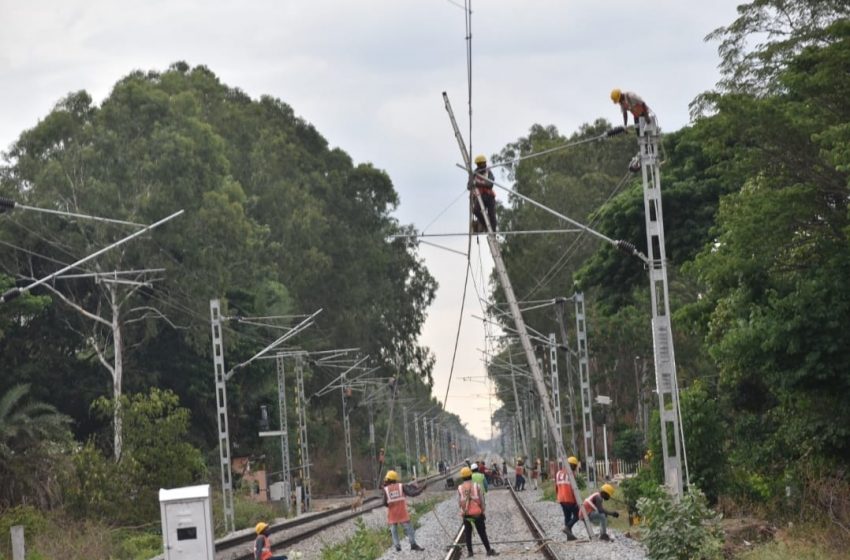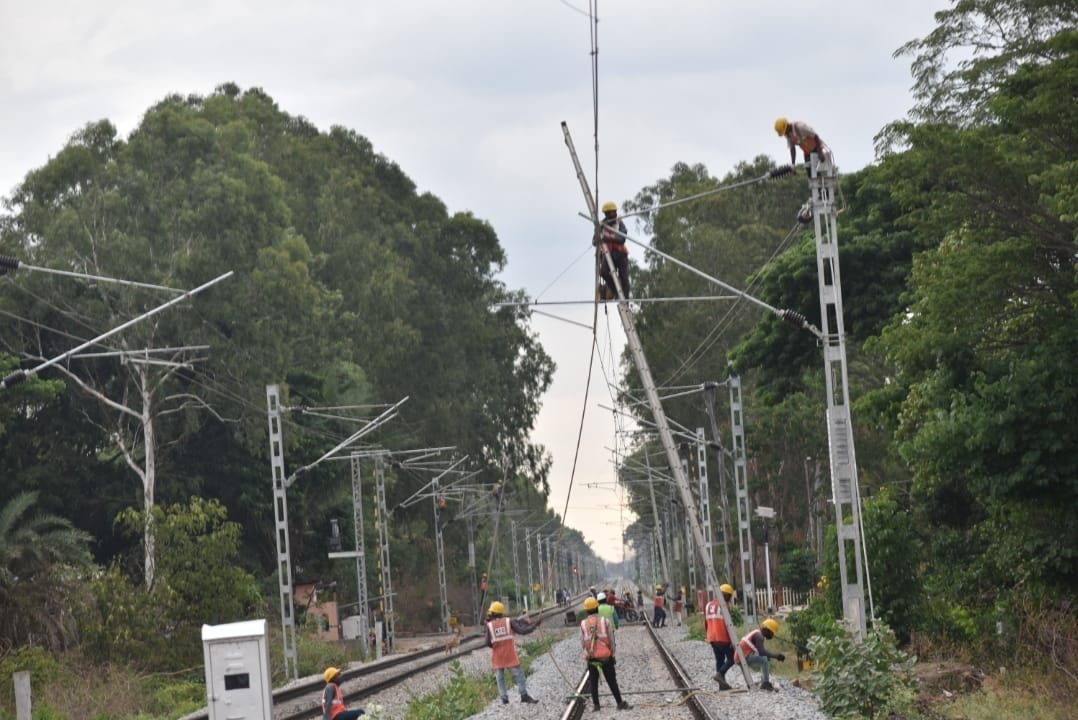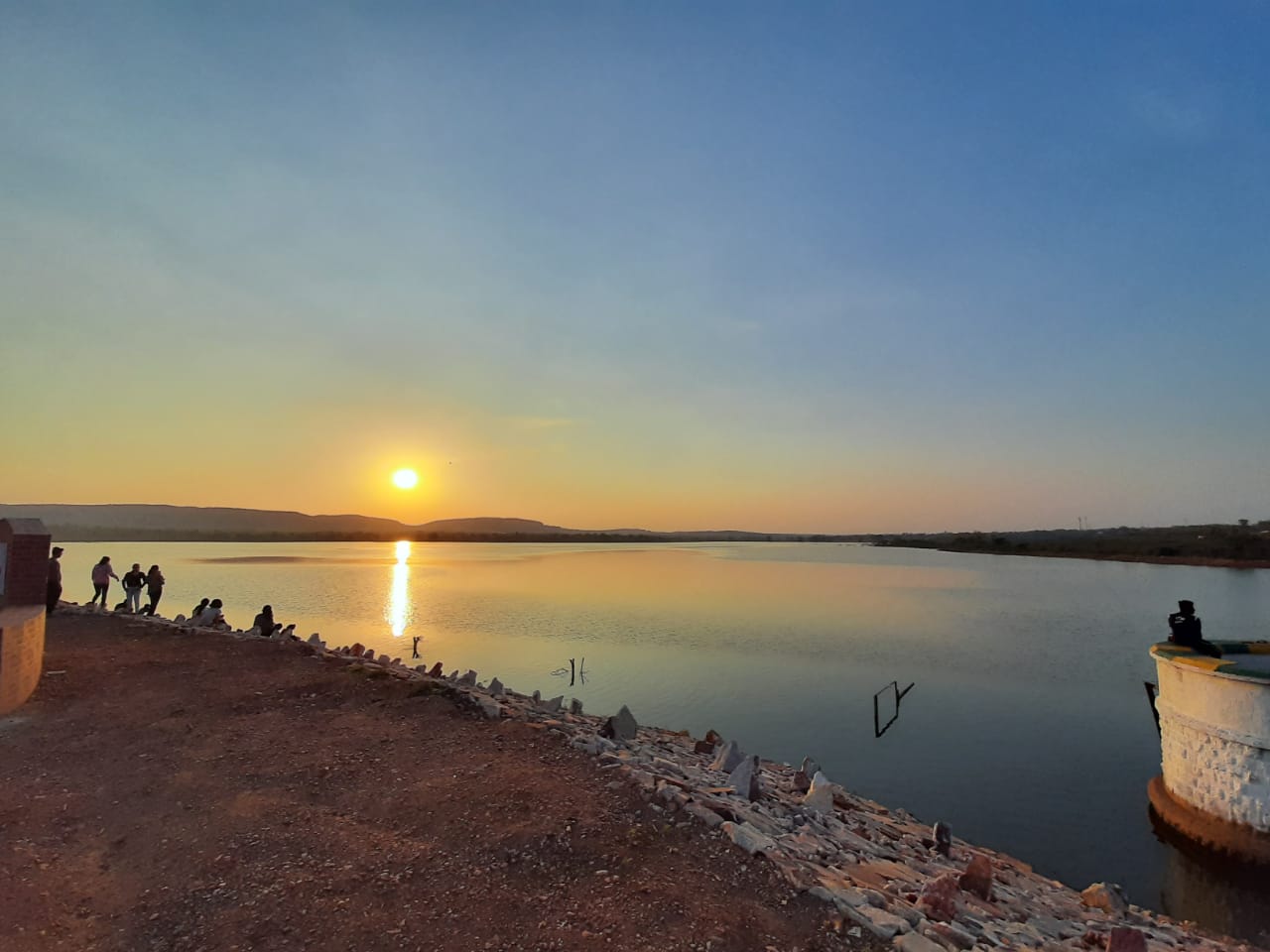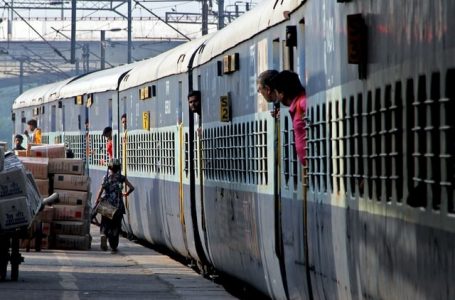South Western Railway & Indian Railways take environmental friendly initiatives

Electrification Work Under Progress In SWR
Indian Railways (IR) is moving towards becoming a “net zero carbon emitter” before 2030. IR is looking at helping the environment from its biggest to the smallest steps ranging from massive electrification, day to day water and paper conservation. In the last year 2020-21, IR completed 6100 route km and South Western Railway (SWR) completed 303 route km of electrification. The entire IR Broadguage network and SWR rail network is set to be electrified completely by Dec 2023.

Complete electrification of IR will result in savings of approx ₹13,500 crores per annum. In SWR at least 60 trains are proposed to be run with electric traction by March 2022 resulting in ₹9.05 crore savings per month. With Electrification, for power supply onboard the coaches, head on generation technology will be used which will draw electricity directly from over headline and diesel generator use will be stopped. This will result in significant savings and reduction of pollution.
Also read: SWR completes safety inspections, works, gears up for monsoon
In SWR, so far in 30 trains power car has been made HOG compliant. This has resulted in savings of ₹33.65 crores in 2021-22.
SOLAR INITIATIVES
IR has installed about 114 MW of solar rooftop plants in over 1,000 stations and 400 service buildings. In SWR, 128 stations and 306 level crossing gates are provided with solar panels with an energy generation capacity of 4535kW.
RAINWATER HARVESTING
To promote water conservation, IR has been providing rainwater harvesting system (RWHs) at various locations as per extant policy. Rain Water Harvesting system (RWHs) is being provided in all establishments having rooftop areas of more than 200 square meters. With a consistent effort of zonal railways, 6,112 rainwater harvesting systems have been installed in Railways up to March 2021. In South Western Railway 363 locations are provided with a rainwater harvesting system.
ENVIRONMENT MANAGEMENT CERTIFICATE
In SWR, till date, nine stations in Hubballi division, namely SSS Hubballi, Dharwad, Vasco da Gama, Belagavi, Vijayapura, Hosapete, Ballari, Gadag, Londa; 17 stations in Bengaluru namely KSR Bengaluru City, Yesvantpur, Bengaluru Cantt, Kengeri, Krishnarajapuram, Bangarpet, Satya Sai Prashanti Nilayam, Mandya, Channapatna, Hindupur, Hosur, Kuppam, Malur, Ramanagaram, Tumakuru, Whitefield, Yelahanka, and 12 stations in Mysuru Division namely Mysuru, Davangere, Shivamogga Town, Arasikere, Birur, Harihar, Hassan, Chamarajanagar, Nanjanagud Town, Subrahmanya Road, Sagara Jambagaru, Srirangapattana have been certified with ISO 14001:2015 certification.
This has enabled these stations to be maintained in an environmentally friendly manner. Solid and liquid waste disposal, handling is being done in a scientific manner following the principles of waste segregation at source and environmental-friendly disposal.
Green certification mainly covers the assessment of parameters having a direct bearing on the environment, such as energy conservation measures, use of renewable energy, greenhouse gas emission reduction, water conservation, waste management, material conservation, recycling etc.
In addition, over 600 Railway Stations have been certified for implementation of the Environment Management System to ISO: 14001:2015 in the last two years. A total of 718 stations have been identified for ISO: 14001:2015 certifications.
REJUVENATION OF CENTURY OLD TANK IN HUBBALLI
In Hubballi division, a man-made lake on the railway premises initially constructed in 1917 at Devaragudihal village about 20km away from Hubballi city had dried up. This lake was rejuvenated in 2020 with the in-house effort of the Railway. The entire pipeline was traced and re-built to pump the water from the lake to Railway facilities.

The 278-acre large lake now supplies water to Railway colonies and stations. This is a significant step in making Hubballi division become self-sufficient in water management. It is supplying 10-12 lakh litres of water to Railway colonies, workshops and stations and it has resulted in a saving of ₹1 crore per annum in expenditure related to water bills.
A large number of gardens and parks have been developed and sustained to increase green cover in the division. A vertical garden has been developed in the upcoming Dharwad Station. Gardens are developed in Ballari, Gadag, Indi, Almatti, SSS Hubballi Stations also.
BENGALURU DIVISION INITIATIVE
Bengaluru division has developed gardens and tree plantation at 25 locations over an area of 36479 sqm. In 2020-21 3 sewage treatment plants with 19 lakh capacity water recycling and in 2021-22 2 sewage water treatment plants with l8 lakh water recycling plants have been commissioned in Bengaluru division. Six plastic bottle crushing machines have been installed in the division, to date.
A dense plantation with a high survival rate called Miyawaki Forests has been developed in Krishnarajapuram Shed and Cantonment Station areas in collaboration with NGOs.
MYSURU DIVISION INITIATIVE
By actively installing solar rooftop plants, Division has saved ₹12,51,366 annually in terms of electricity bills. In 12 stations plastic bottle crushing machines are installed. Rainwater harvesting is done in all colonies of the division.
In the entire zone, all lighting provided with energy-efficient LED lighting. The three divisions have complied with all the directions of the National Green Tribunal with regard to environmental norms, pollution reduction, waste management and disposal. Gardens and tree plantation has been taken up at numerous locations to maintain the green cover in the area.
These environment-friendly initiatives will not only save reduce pollution but also result in saving of expenditure in SWR. In all divisions, regular awareness drives on avoiding plastic use have been taken up over the last year. By 2023, Indian Railways will be the largest completely electrified Railway Network in the world, this becoming the largest ‘Green Railway’, globally.
This post has been published in arrangement with Jaideep J Shenoy



